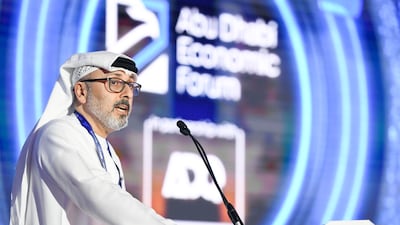Mubadala Investment Company, Abu Dhabi’s sovereign investor, aims to boost its exposure to sectors with “favourable mega trends” in geographies across the world as it continues to focus on doubling the size of its portfolio in the coming decade.
It plans to invest in sectors including life sciences, consumer, technology, venture and growth capital in Asia and other emerging markets, Waleed Al Muhairi, deputy group chief executive of Mubadala told Abu Dhabi Finance Week on Monday.
“We always maintain a long-term perspective, with an investment strategy underpinned by three simple principles,” Mr Muhairi said.
“Number one, to gradually reduce our exposure to sectors with prevailing headwinds."
The second strategy is to “enter and grow our exposure to sectors and geographies fuelled by favourable mega trends, life sciences, consumer, technology, venture and growth capital, geographies such as Asia and other emerging markets”.
The third is to “increase our exposure to stable asset classes that improve the predictability of return and hedge against future business cycles, such as real estate, infrastructure and private credit".
Mubadala, which invests on behalf of the Abu Dhabi Government, is at the heart of the emirate’s efforts to diversify its revenue base and generate income from sources other than oil.
With assets worth Dh1.01 trillion ($276 billion), the sovereign fund’s investment portfolio spans six continents. It has interests in a number of sectors and asset classes, including aerospace, information and communications technology, semiconductors, metals and mining, renewable energy, oil and gas and petrochemicals.
Last year, it invested Dh107 billion across sectors such as life sciences, renewable energy and digital infrastructure and received proceeds of Dh106 billion by monetising assets at strong valuations.
“Growth and innovation are happening around the globe and we want to take advantage of those opportunities wherever they may be,” Mr Muhairi said.
“Therefore, while our largest market remains the United States, with commitments of over $100 billion, we are also looking to expand our portfolio in China by leveraging our network of contacts and partners.”
US investment
Mubadala made a number of investments in the US, the world's largest economy.
Earlier this year, Mubadala formed a strategic partnership with New York-based alternative asset manager Blue Owl Capital as it seeks to co-invest in private credit opportunities amid a tightening monetary environment around the world.
The partnership was established with a $1 billion commitment to Blue Owl’s credit platform and will initially focus on its technology-lending strategy, which provides financing solutions for several tech and software companies.
It also made an investment in the US-based Aligned Data Centres to expand its portfolio in the world’s largest economy.
It is also boosting its presence in China, the world's second-largest economy. In March, the fund co-led a $300 million series B funding round for China’s industrial supply chain technology company, JD Industrials, alongside global investment manager 42XFund.
"The types of investments we typically consider are those that offer sustainable financial returns over the long run … think decades, rather than months or a couple of years,” Mr Muhairi said.
“This puts the concept of mega trends, powerful, transformative forces that change the global economy, business and of course society at the centre of our investment thesis.”
He said Mubadala is committed to working in partnership with other agencies to make Abu Dhabi "a world-class commercial and business hub, driving entrepreneurialism, job creation and innovation thereby helping diversify our economy even further".
Home-grown champions
Mubadala is "proud to have created a number of home-grown champions that today are acclaimed around the world", including Abu Dhabi's clean energy company Masdar, which has projects with a combined value of "more than $30 billion in 40 countries and the capacity today of 20 gigawatts", he said.
Other companies include satellite services provider Yahsat and Strata, an Al Ain-based company, which manufactures aircraft components.
Abu Dhabi's global tech ecosystem Hub71 "provides founders with exceptional access to a capital ecosystem, a global network of partners and a vibrant community filled with highly skilled talent".
"It is therefore not surprising that start-up applications for the latest cohort in October just one month ago, totalled more than 1400 from over 100 different countries around the globe."
While sovereign investors such as Mubadala are focused on their longer term objectives, those with a slightly shorter investment span need to consider the interconnectivity of factors shaping the global macro and investment environment.
"Our economic and debt situation affects our political situation, which [in turn] affects our geopolitical situation," Ray Dalio, founder of the US-based investment management firm Bridgewater Associates, told ADFW delegates.
"Almost everything important falls under one of those categories, and then thinking about how they relate to each other, one can create a somewhat vivid picture of the trends that are emerging."
The billionaire investor, whose hedge fund is the biggest in world, said the next five to 10 years were going to be "radically different" as investors approached these interrelated factors as a whole.
"We talk about climate [change and its] estimated cost to the world is between $5 trillion and $10 trillion a year," he said, adding that it was a significant hit considering the size of the world gross domestic product at $100 trillion.
Mr Dalio, who established a branch of his family office in Abu Dhabi this year as part of its Middle East expansion, said he remained bullish on investing in the emirate, as well as markets in the region.
"Abu Dhabi is one of those Renaissance states" that is financially sound and has attracted talent and venture capital, he said.
"I'm excited to invest in the region. I expect others, when they get exposure to it, will also enjoy and profit from it."

